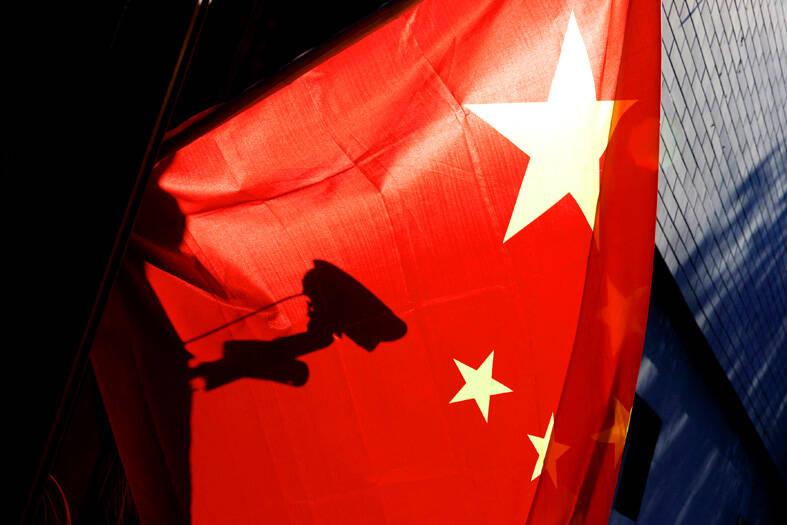China's government today said it would carefully review e-mailed tips it has received about Taiwan "separatist" activity, adding that "good people" have nothing to worry about.
Beijing has been stepping up its campaign against those it accuses of being "separatists", including in June threatening to execute "diehard separatists."

Photo: Reuters
Last month, it announced an e-mail address where people could report tips about the crimes committed by such people.
Asked at a routine news conference in Beijing how the new e-mail system was working, Chen Binhua (陳斌華), spokesperson for China's Taiwan Affairs Office, reiterated that their measures targeted only a very small minority.
"After the establishment of the mailbox for reporting diehard Taiwan independence elements, people on both sides of the Taiwan Strait have responded with practical actions," he said.
This is a reflection of the "common aspirations" of people on either side of the Strait, Chen added.
"We will carefully verify and screen the clues we receive," he said. "We will never let a single Taiwan independence element off the hook, but we will never wrongly accuse good people either."
Taiwan's government has condemned China's new campaign, and warned against all but absolutely necessary travel to the country.
China says that is alarmist nonsense.
China has not placed President William Lai (賴清德) on its list of "hardcore separatists," unlike Vice President Hsiao Bi-khim (蕭美琴), Minister of National Defense Wellington Koo (顧立雄) and some others in his administration and party.
"Taiwan independence is a scourge, a dead end; it won't come to pass," Chen said, speaking of Lai's first 100 days in office.
Lai has repeatedly offered talks with Beijing, but been rebuffed, and also repeatedly warned of the danger Taiwan faces from its giant neighbor and the need to strengthen their defenses.

Taiwan has received more than US$70 million in royalties as of the end of last year from developing the F-16V jet as countries worldwide purchase or upgrade to this popular model, government and military officials said on Saturday. Taiwan funded the development of the F-16V jet and ended up the sole investor as other countries withdrew from the program. Now the F-16V is increasingly popular and countries must pay Taiwan a percentage in royalties when they purchase new F-16V aircraft or upgrade older F-16 models. The next five years are expected to be the peak for these royalties, with Taiwan potentially earning

STAY IN YOUR LANE: As the US and Israel attack Iran, the ministry has warned China not to overstep by including Taiwanese citizens in its evacuation orders The Ministry of Foreign Affairs (MOFA) yesterday rebuked a statement by China’s embassy in Israel that it would evacuate Taiwanese holders of Chinese travel documents from Israel amid the latter’s escalating conflict with Iran. Tensions have risen across the Middle East in the wake of US and Israeli airstrikes on Iran beginning Saturday. China subsequently issued an evacuation notice for its citizens. In a news release, the Chinese embassy in Israel said holders of “Taiwan compatriot permits (台胞證)” issued to Taiwanese nationals by Chinese authorities for travel to China — could register for evacuation to Egypt. In Taipei, the ministry yesterday said Taiwan

Taiwan is awaiting official notification from the US regarding the status of the Agreement on Reciprocal Trade (ART) after the US Supreme Court ruled US President Donald Trump's global tariffs unconstitutional. Speaking to reporters before a legislative hearing today, Premier Cho Jung-tai (卓榮泰) said that Taiwan's negotiation team remains focused on ensuring that the bilateral trade deal remains intact despite the legal challenge to Trump's tariff policy. "The US has pledged to notify its trade partners once the subsequent administrative and legal processes are finalized, and that certainly includes Taiwan," Cho said when asked about opposition parties’ doubts that the ART was

If China chose to invade Taiwan tomorrow, it would only have to sever three undersea fiber-optic cable clusters to cause a data blackout, Jason Hsu (許毓仁), a senior fellow at the Hudson Institute and former Chinese Nationalist Party (KMT) legislator, told a US security panel yesterday. In a Taiwan contingency, cable disruption would be one of the earliest preinvasion actions and the signal that escalation had begun, he said, adding that Taiwan’s current cable repair capabilities are insufficient. The US-China Economic and Security Review Commission (USCC) yesterday held a hearing on US-China Competition Under the Sea, with Hsu speaking on